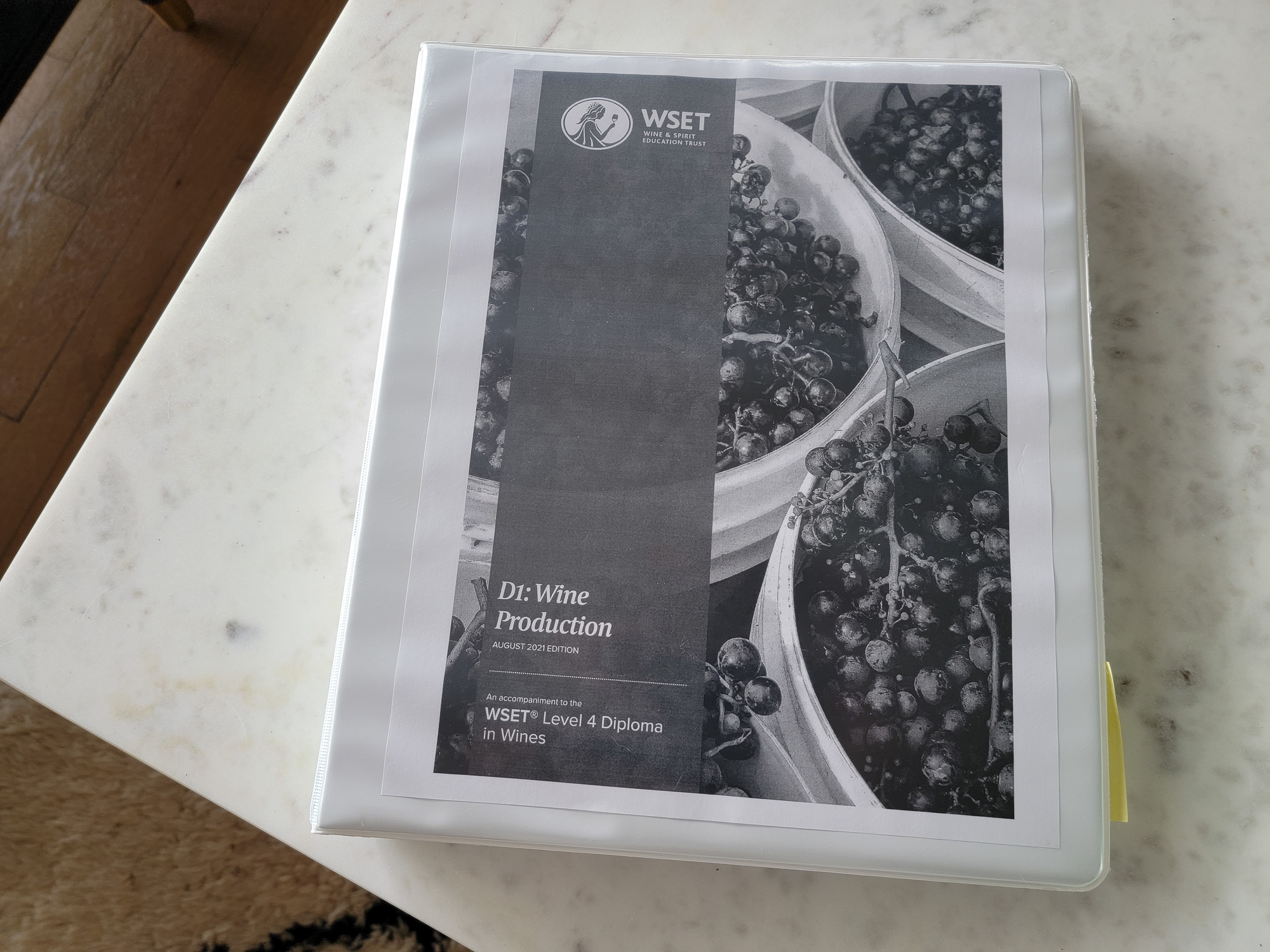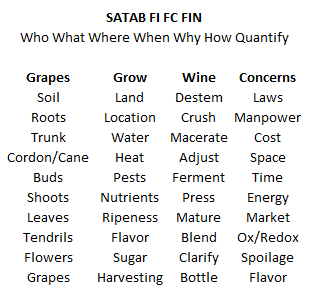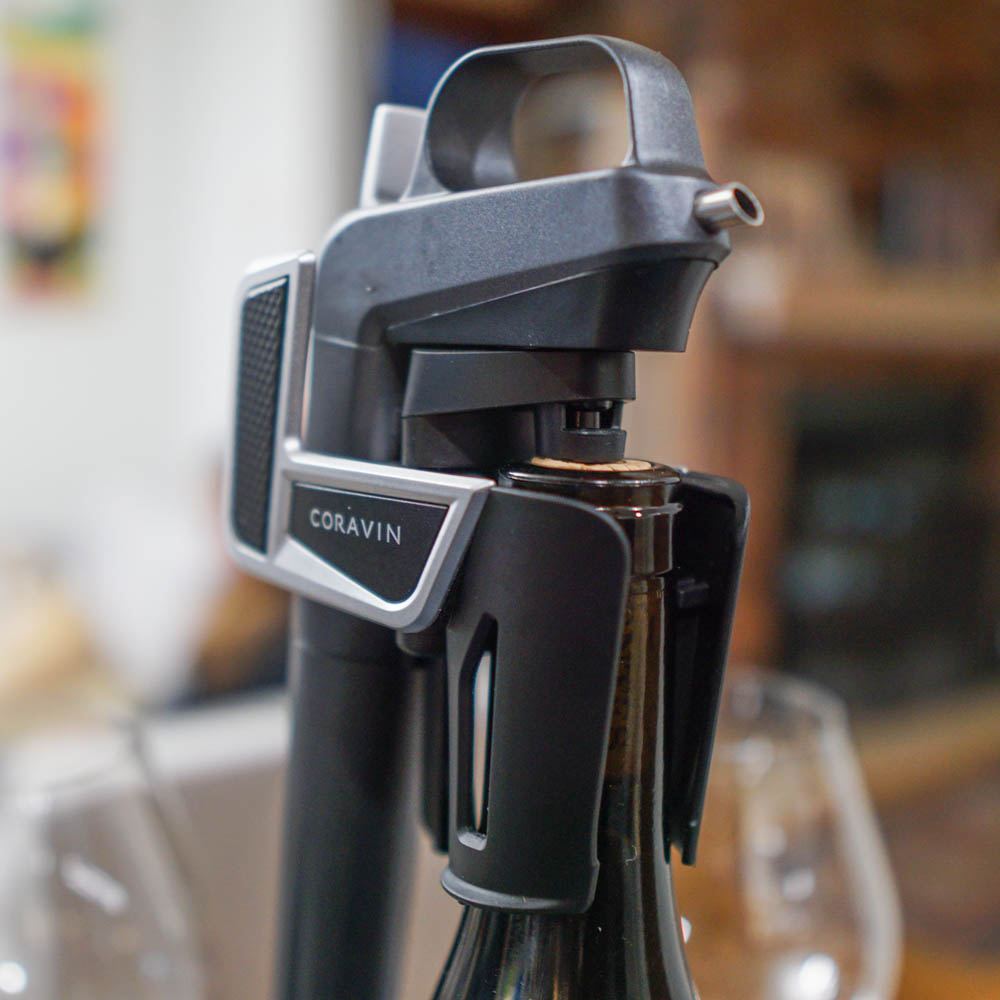Published by Jeremy.
Disclaimers: We use demographic data, email opt-ins, display advertising, and affiliate links to operate this site. Please review our Terms and Conditions for more information. This website is intended for those of legal drinking age in your jurisdiction.
Oh WSET Diploma, you are a beast.
Unlike lower courses of WSET (like WSET Level 2 or Level 3) which can be completed in a single, multi-week module, Diploma (or WSET Level 4) is on an entirely different level. This one has six unique modules that students must take over an 18-to-36 month period at a pace of their choosing.
Of these modules, five of the six have corresponding essay exams (the sixth is a research paper) and some also have tastings (D3, D4, and D5). We'll cover logic for tackling this beast of a program as a whole in a later article, but for this one, I wanted to dive down into details of what the D1: Wine Production exam is like and give a few tips on how I prepared ahead of time.
Get ready to memorize a boatload of facts!
Note: I took the WSET Diploma D1 exam in September 2021. Test material and structure can and does change over time. I passed D1 with distinction.
What to Expect in the WSET D1 Exam
The WSET Diploma D1 exam is an essay-only exam, much like module D2. While some test-takers will be relieved that there is no tasting component in this first module, it does highlight the fact that you have to have a somewhat mastery of the material in order to pass (albeit at a nominal 55% score). You literally have nothing else to boost your points here- no multiple choice, no tasting, nothing else other than written answers.
So when I say you better be prepared, I mean it.
Preparing for the D1 exam is challenging simply because the grading feels a bit different than WSET Level 3. Part of this is because of how the points are distributed. In the WSET Level 3 essay exam, you were likely given an absurd number of questions with nominal points per question (2, 3, 5, etc). Our instructor hammered it into us that in Level 3, the number of points per question should match the number of unique responses you give- e.g. a three-point question should have three thought-out responses to get each respective point.
I leaned into this when taking the exam which I feel helped considerably. Before time ran out, I counted my unique responses for each question and made sure I had enough, if not more “points”, for each question's respective total. I attribute this to one of the reasons I passed the essay exam with distinction (surprisingly a score only achieved by about 3-7% of test takers)- I was not leaving points on the table by not being detailed enough.
For Diploma, questions are given as a percentage of the total score. So instead of three points, you may have 5%. Instead of 30 points, you may have 50%, etc. I picked these numbers somewhat arbitrarily because the percentages are now no longer tied to how many key points the graders are looking for. Instead, our instructor likened them to how much of your time you should spend writing out the answer. That 5% question should take 5% of your time, that 50% question should take 50%, etc. As most answers outside of basic “define” questions require in-depth and complex answers, you really can't get by with counting points like you did in Level 3.
Here is where things get tricky. A 5% answer may require just one sentence and have only two or three main points (not five). A 30% answer, on the other hand, may have 50 key points the graders may be looking for. How many you need to get all 30% is relative- no instructor I've talked to speaks in definitives in this level.
For what it is worth, I really struggled with grasping just how much information should be provided on the D1 exam to achieve full points. It wasn't until I tackled some practice questions given to me from my school that I really started to understand it. (They also provided a breakout on what different questions mean when they use the terms Define, Describe, Explain, Compare, etc. Really dig in deep on these to understand as it helps provide context to the depth required as well.)
In my opinion, simple Define questions for 5% may require just a sentence or two. Explain/Compare at 15-30% may be a three or five-paragraph essay (possibly including proper intros and conclusions). You may get mostly the former, or you may get a handful of the latter. Whatever happens on test day is completely random so you need to be prepared for anything. No matter what happens, you'll do well to note that you're generally given five double-sided sheets to write on and can craft answers to any question as long or as short as you need to make your points all while keeping in mind the framework for what WSET is looking for with question types (Define, Compare, etc).
While essay questions for WSET D1 are a bit less organized than in Level 3, making it harder for me to discuss here, there are some ways you can prepare for the D1 module and still feel comfortable going into test day. In the next section, I share some things I did to prep!
But before we get into that, it is worth noting that when you enroll in Diploma you can access an online portal by WSET with a wealth of materials, including examiner comments and score breakdowns from past exams. These are invaluable to read for all modules and is a tip we'll be repeating again and again in all Diploma articles. Feedback on why students did not perform well on certain questions (discussed more thematically rather than specific questions) cannot be discounted!
Logic to Consider for the WSET D1 Essays
For me, the biggest challenge I had in D1 was simply keeping all the topics straight in my head. While this module is a more robust version of the same topics from Level 3, the amount of material you have to keep track of is still staggering no matter how you look at it.
My studying process included reading the book about five times as well as crafting a 15 page set of notes to highlight the key points that I did not instinctively remember from WSET Level 3 (plus reviewing those weekly as well).
When I tackled practice questions, I quickly found that this module's information overload made it easy for me to forget about key elements when under the stress of being in exam mode. In winemaking choices, for example, you have many factors including things like preventing or encouraging oxidation, the same for MLF, preventing spoilage organisms, economic concerns, space/time/energy/cost/manpower concerns, quality concerns, laws, and of course market forces to name a few all beyond the actual act of completing fermentation.
If you're prone to forgetting key points when taking tests, you may not recall space concerns, cost concerns, or even oxidation as a talking point outright- I know I did when studying and answering my practice questions!
As such, one of the biggest things I did going into my exam was trying to remember as many general topics as possible and then using logic and reason to go from there. To not forget them during the test, I memorized 40 key topics in four categories (10 each) and wrote them all out on scratch paper at the start of my test as a makeshift key. It looked a bit like the below:
This allowed me to then have a reference point for a good percentage of topics that could appear on the exam in the categories of grape anatomy, grape growing, winemaking, and general concerns found in the three categories. It was only after writing all these out in my exam that I turned the questions over, reviewed them, and then picked keywords from my key that I wanted to include in my answers (these were also written out on scratch paper).
For example, if I were to have a hypothetical question about land concerns when starting a new vineyard, I would have isolated “location, water, heat, pests, soil, nutrients, laws” from the above list very quickly. After writing these out on scratch paper, I now have given myself seven key points I can include in my answer. Did I miss some? Of course. Is that enough to get enough points to pass? I certainly hoped so. But as I likely would've got flustered and forgot soil and pests completely (again, hypothetically), I already knew I was likely coming out ahead relying on this method.
- Grouping into four sets of ten was done by design for memorization purposes. I wrote out the four main categories (plus the SATAB tasting acronym for sweetness, acidity, etc. and the who, what, where, when, why qualifiers) and then 10 dashes off to the side. I would then populate the table with 10 topics and practice writing them out as fast as possible over and over again until they were memorized. The topics I ended up including were never 100% the same, especially in “Grow” and “Concerns”, but I felt like if I had 40 written out it'd give me a head start over going in with nothing. Note that you cannot write anything on your scratch paper until after the exam begins.
From there, our instructor recommended that we bang out the questions we are confident with first and then focus on what remains to tick up to the 55% passing score (if you can rock a 5%, 10%, and 10% question, you're almost halfway to passing- doing them first ensures you don't run out of time and miss easy points later).
Whether or not you tackle it this way could vary on your comfort and questions asked, so I wouldn't go as far as saying this one is necessary for everyone. Personally, I hit my questions in order as I was equally comfortable with all of them; however, if your exam had, say, one 50% question and a bunch of 5-10% questions, I could see merit in getting the easy points first before tackling the big one just to ensure you don't run out of time.
I'd rather run out of time leaving some of a 50% question on the table than missing an objectively easier 5% question completely. Your mileage may vary on this logic.
While I cannot talk about the actual questions I had on my exam, I also have to admit that one of the biggest things that helped me with this module was less about my studying habits and more about my personal background. As a former chemical engineer who worked in water treatment (read: I designed filters for six years), many aspects of this module align with my former career and formal education. So when I say I felt like my exam wasn't as bad as it could've been, part of it is highly specific to me outright and I'll be the first to recognize that.
That being said, this module also wasn't terribly extreme in the overall amount of material you're expected to know. Grape growing and winemaking often boil down to just a few key concepts in even fewer broad categories, so to me remembering those really did go a long way into applying them in the exam. Is there new stuff over Level 3? Yes. Is it that much new that it makes the course terrible? No. It is just more depth. Conversely, for the exam, did I feel like I could've supplied more detail to any question? Sure, I still forgot to use numbers to quantify things almost completely. Do I feel like I easily got a 55% by reducing this module down to these core topics and expanding upon them? Absolutely.
From there, how much your specific exam experience relates to mine really just depends on the questions you get, their relative point scales, and if you are unlucky to get a curveball question on a topic you didn't focus as much on (I was so happy to not see mine in my exam, and no, I will not say what the topic was). Just remember all your core topics, and don't forget to elaborate, explain, quantify, use examples, and dig deep to remember all the facts you read over and over and over again.
More detail is never a bad thing at the Diploma level, insofar as you have the time to keep writing!
Have you taken the WSET Diploma D1 exam? What did you think and did you do anything special to study? Comment below to share!
Upgrade Your Home Wine Bar
Need to upgrade your wine bar? Grab some new wine accessories:





